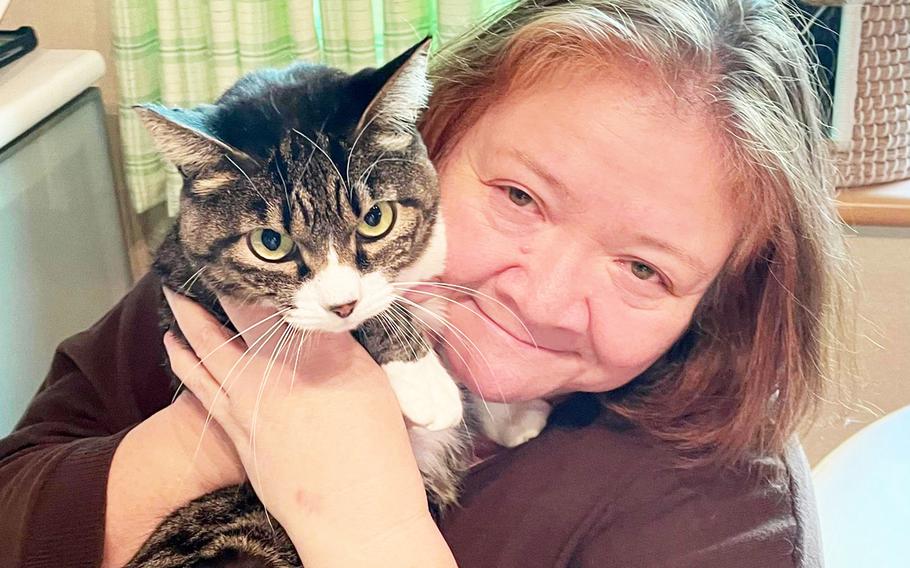
Natalie Kuri poses with Nyanjiro, a foster cat, at her home near Yokota Air Base, Japan, Feb. 28, 2023. (Kelly Agee/Stars and Stripes)
YOKOTA AIR BASE, Japan — Over the past five years, an animal-rescue volunteer has found new homes for 30 cats, many of them left behind by relocating Air Force families at this airlift hub in western Tokyo.
Natalie Kuri, an analyst with Yokota’s 374th Civil Engineer Squadron, has spent countless hours and her own money to feed, trap and house stray cats on the base. She is caring for a group of 11 cats, or a clowder, at her home in the nearby city of Tachikawa and has taken in as many as 15.
Six felines are currently roaming Yokota, Kuri said March 1 by Facebook Messenger.
“She’s working hard for animals, taking them to the vet if they’re sick, taking care until they are healthy and ready to find a forever family,” Mari Matsushima, an Auto Hobby Shop employee at Yokota who has donated cat food to Kuri, told Stars and Stripes on Feb. 27.
Sometimes people leave their pets behind, Kuri told Stars and Stripes on Feb. 15. She will care for the animals or leave them with foster families until she finds them a permanent home.
Megumi Onozawa, an accountant for Defense Finance and Accounting Services at Yokota, and her husband, Nikolas Lyon, fostered two cats, Kuntaro and Kuko, for three months and adopted a third, Lyon said.
“She is helping to keep the stray cat population low and helping the animals find new homes,” Onozawa said Feb. 26 by Facebook Messenger.
The 374th Airlift Wing at Yokota acknowledges the stray cat problem and Kuri’s work to keep them in check.
“Our Civil Engineer Squadron leadership have been made aware of and support Ms. Kuri’s volunteer efforts,” wing spokesman 1st Lt. Danny Rangel said via email Wednesday.
“We recognize the dedication of base members who volunteer their time to improve our community and benefit our base residents. Leadership has not provided funding support to her voluntary efforts but has expressed appreciation for her efforts in caring for the more furry members of our community.”
Kuri’s most recent charge is Luna, who fled from her family in December just as they were boarding a plane for a new duty assignment. Kuri is providing the cat a temporary home and veterinary care.
One of the most challenging tasks about being an animal rescuer is the time spent caring for the animals, including constant vet visits, Kuri said.
“It's a lot,” she said. “Time is very tough.”
Though she spends much of her own time and money helping the Yokota cats, Kuri also receives help from the local community, including donations of food and blankets.
Onishi Animal Clinic in Tachikawa and Kimoto Animal Hospital in Hino discount their spay and neuter services for Kuri’s animals. They’ll charge her about $37 for a procedure that typically costs 10 times that much.
Before Kuri rehomes the cats, she screens the candidates to make sure they’ll properly care for the animals. She also has them sign a protective cat transfer agreement. The contract includes a list of other agreements, including neutering the cat after six months of age and keeping the cat indoors.
Though animal rescue seems like a thankless job, Kuri said it has been worth her time.
“I have pride, responsibility and respect for animals and their families,” she said. “The lives I have connected become even more connected and happy. Volunteering has been so much fun to me.”